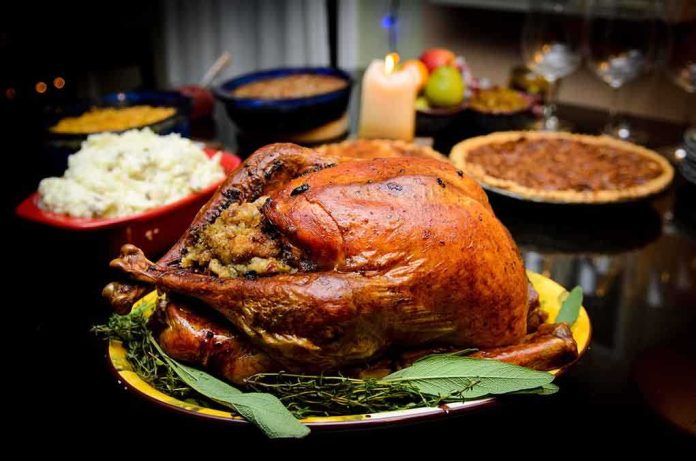
A new narrative suggests that the fall in Thanksgiving prices was due to the defeat of the “Green Agenda,” stirring debates among conservatives and climate policy critics.
Story Highlights
- Thanksgiving meal prices have decreased in 2025, attributed to policy changes.
- Retailers are offering aggressive discounts to attract budget-conscious shoppers.
- Experts argue that the decline is due to retailer promotions, not policy rollbacks.
- Market analysts cite avian flu and demand as primary price influencers, not environmental policies.
Thanksgiving Prices and the “Green Agenda”
Thanksgiving meal prices have reportedly decreased in 2025, with some attributing this change to a rollback of the so-called “Green Agenda.” This narrative suggests that environmental policies previously increased food costs and that their defeat has provided relief to consumers. However, this claim lacks widespread substantiation from mainstream economic or agricultural reports.
During the 2022–2023 period, food prices surged due to inflation, supply chain disruptions, and avian flu outbreaks. In 2024–2025, while wholesale market volatility continued, retail prices for some food items, particularly turkey, stabilized. Aggressive discounts by retailers like Aldi and Kroger have helped reduce the cost of Thanksgiving meals, drawing in consumers.
Economic Factors Driving Price Trends
Analysts highlight that the slight decline in retail turkey prices is primarily due to retailer promotions. Despite avian flu continuing to affect wholesale costs, retailers are absorbing some price increases to maintain customer loyalty. Other Thanksgiving staples, such as canned cranberry sauce, have seen price increases due to tariffs and adverse weather conditions impacting crop yields.
Market experts, including Mark Jordan of Leap Market Analytics, emphasize that the high wholesale turkey prices result from avian flu and increased demand rather than environmental regulation. David Ortega from Michigan State University also notes that retailer strategies are reducing retail prices despite wholesale pressures.
Political and Market Reactions
While some political figures attribute the changes in Thanksgiving meal prices to policy decisions, market analysts and agricultural economists argue that supply, demand, disease, and trade factors are more significant influencers. The narrative linking environmental policy rollbacks to food price changes is not supported by economic data or expert analysis.
Overall, consumers are benefiting from lower retail prices for turkeys and some meal bundles, although inflation persists in other food categories. Retailers face tighter margins due to aggressive discounting, and the sustainability of price relief remains uncertain if wholesale costs continue to rise.
Sources:
ABC News – Stores brace for tough year as turkeys and other Thanksgiving foods cost more




